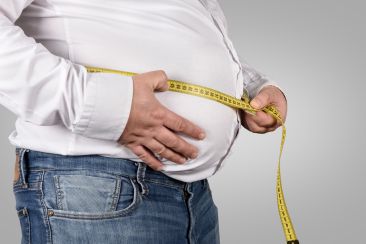
What Vitamins Help With Weight Loss?
What Vitamins Help With Weight Loss?
When most people try to lose weight, they think about eating less and moving more. While that’s important, there’s something else that can make a big difference: vitamins.
Vitamins don’t burn fat on their own, but they help your body work better. Some vitamins give you energy, help your body break down food, and support your metabolism (how your body turns food into fuel). If you're missing specific vitamins, it can be harder to lose weight, even if you’re eating healthy and exercising.
Many people don’t get enough of the right vitamins, especially if they’re on a strict diet or don't eat a variety of foods. This can lead to tiredness, cravings, and a slower metabolism.
In this blog, we’ll explore the most effective vitamins for weight loss. We’ll explain what they do, where to find them in food, and when a supplement might help. You’ll also learn how to use vitamins safely as part of a healthy lifestyle.
Let’s get started and see how vitamins can help support your weight loss goals!
Why Vitamins Matter for Weight Loss
You might be asking, how can vitamins help you lose weight? The answer is that your body needs vitamins to do many important jobs. Some of these jobs include converting food into energy, maintaining steady hunger levels, and supporting muscle strength.
If you do not get enough vitamins, your body may not work as well as it should. You may feel tired, hungrier, or find it harder to lose weight, even if you are eating healthily and being physically active.
Here are some ways vitamins can help with weight loss:
- They help your body burn energy. This is called your metabolism. Some vitamins help your body use energy from the food you eat.
- They help control your appetite. Some vitamins help your brain know when you are full.
- They give you energy. When you feel more awake and active, it is easier to move your body and stay fit.
- They protect your muscles. Muscles use more energy than fat, even when you are resting. Therefore, maintaining strong muscles can help you burn more calories.
Many people do not get enough vitamins, especially if they eat the same foods consistently or skip meals. That is why it is essential to eat a variety of healthy foods. Some people also use supplements to get the vitamins they need.
Next, we will discuss the best vitamins for weight loss and how they support your body.
B Vitamins: Helping Your Body Use Energy
B vitamins are a group of essential vitamins that help your body get energy from the food you eat. They work like tiny helpers inside your body, making sure everything runs smoothly. There are several types of B vitamins, each with a distinct function.
Here are some of the main B vitamins and what they do:
- Vitamin B1 (thiamine): Helps your body turn food into energy
- Vitamin B2 (riboflavin): Supports your metabolism and helps keep your skin and eyes healthy.
- Vitamin B3 (niacin): Helps your body use fat for energy
- Vitamin B6: Helps control hunger and supports your mood
- Vitamin B9 (folate): Helps in the production of new cells and maintaining brain health
- Vitamin B12: Helps make red blood cells and gives you energy.
If you do not get enough B vitamins, you may feel tired, weak, or experience difficulty thinking clearly. Some people who eat very little meat, like vegetarians or vegans, may not get enough vitamin B12.
B vitamins can be found in foods like eggs, fish, meat, leafy green vegetables, beans, and whole grains. You can also take a B vitamin supplement if your doctor or nurse recommends it.
These vitamins do not directly burn fat, but they help your body utilise food as fuel. This can make it easier to stay active, feel good, and healthily lose weight.
Vitamin D: The Sunshine Vitamin
Vitamin D is often referred to as the "sunshine vitamin" because your body produces it when your skin is exposed to sunlight. However, many people do not receive enough sunlight, especially during the winter or when spending a lot of time indoors. That means they might not have enough vitamin D in their bodies.
Vitamin D helps with many things, like:
- Keeping your bones and teeth strong
- Helping your muscles work well
- Supporting your immune system (the part of your body that fights illness)
However, did you know that vitamin D can also aid in weight loss?
Studies show that vitamin D may help your body burn fat more efficiently and prevent it from storing excessive amounts. It also helps control hunger and stabilise your mood, making it easier to make healthy choices.
Individuals who are deficient in vitamin D often experience increased fatigue and tend to gain weight more easily. If you are low, your doctor can do a simple blood test to check.
You can get vitamin D from:
- Sunlight (about 10 to 30 minutes a few times a week)
- Foods like oily fish (such as salmon), eggs, and fortified milk
- Vitamin D supplements (especially in winter)
Getting enough vitamin D can help your body stay strong, feel energised, and support your weight loss goals.
Vitamin C: Helping You Feel Full and Energetic
Vitamin C is well known for helping your body fight off colds, but it does a lot more than that. It can also aid in weight loss in several beneficial ways.
First, vitamin C helps your body convert fat into energy during exercise. If you don’t have enough vitamin C, your body may not burn fat as well. This means that exercise may not be as effective for weight loss if your vitamin C levels are low.
Second, vitamin C helps control hunger. It supports your brain and nervous system, which can help you feel full and prevent overeating. It can also improve your mood, which makes it easier to make healthy choices.
Third, vitamin C helps you recover after exercise. It functions as an antioxidant, which means it protects your body from damage and helps your muscles recover and heal faster.
You can get vitamin C from:
- Oranges, lemons, and other citrus fruits
- Strawberries, kiwi, and pineapple
- Red peppers, tomatoes, and broccoli
Most people can get enough vitamin C from food, but if you need more, your doctor might suggest a supplement.
Vitamin C may not directly burn fat, but it helps your body stay strong, feel full, and function better, essential components of a healthy weight loss regimen.
Magnesium and Zinc: Small Minerals, Big Help
Magnesium and zinc are two essential minerals that your body needs to maintain good health. Even though you only need small amounts, they perform massive jobs, including aiding in weight loss.
Magnesium
Magnesium helps your muscles function properly and keeps your heart beating regularly. It also helps your body get good sleep, and sleep is essential for weight loss. When you sleep well, your body can better control hunger and stress.
Magnesium also helps regulate blood sugar levels, which means it helps keep your energy steady. If your blood sugar goes up and down too quickly, you might feel hungry more often or crave sugary snacks.
You can get magnesium from:
- Green leafy vegetables like spinach
- Nuts and seeds
- Whole grains and beans
Zinc
Zinc helps your body use food as energy and supports your immune system. It also helps your body produce hormones that regulate hunger and metabolism (the process by which your body burns calories).
If you do not get enough zinc, your body might store more fat and burn less energy. Zinc also helps maintain a balanced mood, which can aid in making better food choices.
You can get zinc from:
- Meat, fish, and eggs
- Nuts and seeds
- Whole grains and dairy
Getting enough magnesium and zinc can help your body feel strong, sleep better, and manage hunger, all of which can support healthy weight loss.
Calcium: Keeping Your Body Strong and Balanced
Most people are aware that calcium plays a crucial role in building strong bones and teeth. But calcium also plays a vital role in weight loss.
Calcium helps your body in a few key ways:
- It keeps your muscles working correctly. This is important because strong muscles help your body burn more calories, even when you are resting.
- It helps control fat storage. Some studies suggest that individuals who consume sufficient calcium may store less body fat.
- It supports your metabolism. That means it helps your body turn food into energy.
If you are trying to lose weight, it’s important not to lose muscle. Calcium helps protect your muscles, especially when you are eating less or engaging in more exercise.
You can get calcium from:
- Milk, yoghurt, and cheese
- Leafy greens like kale and broccoli
- Fortified plant milks (like almond or soy milk with added calcium)
Vitamin D helps your body absorb calcium, so it’s a good idea to make sure you’re getting both.
Calcium doesn’t make you lose weight on its own, but it can help your body stay strong and support your weight loss.
Other Nutrients That May Help With Weight Loss
Besides vitamins and minerals, there are a few other nutrients that can also support your weight loss journey. These are not as well-known, but they help your body work better and feel healthier.
Omega-3 Fatty Acids
Omega-3s are healthy fats found in fish like salmon, sardines, and mackerel. They help reduce swelling in the body (called inflammation), which can make it easier to lose fat. Omega-3s may also help control hunger and improve your mood.
You can get omega-3s from:
- Oily fish
- Flaxseeds and chia seeds
- Omega-3 supplements like fish oil
Fibre
Fibre helps you feel full after meals, which means you are less likely to overeat. It also aids digestion and helps keep your tummy feeling comfortable.
You can get more fibre by eating:
- Fruits and vegetables
- Whole grains like oats and brown rice
- Beans and lentils
Probiotics
Probiotics are “good” bacteria that live in your gut. They aid digestion and may even impact your weight. Some studies suggest that having a healthy gut can make it easier to manage weight.
You can find probiotics in:
- Yoghurt with live cultures
- Kefir (a drink like runny yoghurt)
- Probiotic supplements
Berberine and Other Herbs
Berberine is a plant extract that some individuals use to aid in fat loss and blood sugar regulation. It's not a vitamin, and its effects are still being studied, so it’s best to consult a doctor before using it.
These extra nutrients may not be necessary for everyone, but they can provide additional support when used correctly.
Next, let’s talk about how to use vitamins and supplements safely.
How to Use Vitamins and Supplements Safely
Vitamins and supplements can help support weight loss, but it’s crucial to use them safely. Taking too much of something or using the wrong type can be harmful. Your body only needs small amounts of each vitamin, and more is not always better.
Here are some easy tips to stay safe:
1. Talk to a Doctor or Nurse First
Before taking any new supplement, speak with a doctor, nurse, or dietitian. They can check if you need it. Sometimes, a simple blood test can show if you are low in specific vitamins.
2. Don’t Take Too Much
Taking large doses of vitamins or minerals can cause side effects. For example, too much vitamin D can hurt your kidneys, and too much iron can make you sick. Always follow the advice on the label or as instructed by your doctor.
3. Eat Healthy Foods First
The best way to obtain vitamins is through a balanced diet of healthy foods. Fruits, vegetables, whole grains, lean meats, and dairy products provide your body with the essential nutrients it needs. Supplements are an additional source of help if you cannot get enough nutrients from food.
4. Know the Different Types
Supplements come in many forms:
- Tablets or capsules that you swallow
- Chewable vitamins or powders
- Drops or sprays for vitamins like B12 or D
- Injections or IV drips, which some people use if they have very low levels (only with medical advice)
You probably do not need anything fancy. Most people do well with a daily multivitamin and a healthy diet.
Using vitamins the right way can help your body stay strong, feel energised, and lose weight more safely. Next, let’s look at a simple weekly plan to help you get started.
Tips To Maintain a Healthy Weight
Maintaining your body weight is essential after you lose weight. Having worked hard for months to lose excess weight, why not strive to prevent gaining weight again in the future? Make informed choices and live a healthy lifestyle to achieve this. The following steps will help you.
Include Vitamins and Minerals in Your Diet
The importance of vitamins and minerals in weight loss has been discussed. Maintaining a steady weight also requires these nutrients. Your metabolism is boosted, you get more energy, and your health is supported, which is helpful when you're on a diet. You'll lose weight and have enough power for physical activities with these nutrients.
Furthermore, specific nutrients, such as fibre, prevent food cravings by making you feel full. Consuming these nutrients makes you less likely to develop severe eating disorders. The functions of your body can be improved with vitamins and minerals. If you do this, your diet plan will be easier to follow, and you will avoid foods and habits that could contribute to weight gain. You can reduce the risk of gaining weight by taking supplements that support your body's natural functions.
Limit Consumption of Unhealthy Foods
You should still avoid eating unhealthy foods if you have achieved your weight loss goals and no longer follow a diet. Most people make this mistake once they lose weight and then revert to eating whatever they want. Their weight loss often ends up being regained. The weight you lost months ago can return in weeks after you worked hard to lose it.
Foods high in fat and packaged foods should be avoided. Choose healthy foods such as vegetables, fruits, legumes, and other nutritious options. It is also essential to limit your alcohol intake since it affects your weight loss progress as well. You feel full after eating healthy foods, and eat less than you should when you eat them.
Stay Hydrated
Staying hydrated is essential for maintaining a healthy weight. There are several ways in which water can aid in weight loss. Your metabolism will be boosted, exercising will be more accessible, and your appetite will be suppressed. Besides helping you lose weight, these properties also play a significant role in maintaining a healthy weight.
It is recommended that you drink at least 3.7 litres of water every day to benefit from it. Maintaining a healthy weight and preventing dehydration will be easier if you follow these steps. Make sure to drink plenty of water daily if maintaining a certain weight is your priority.
Get Good Sleep
To maintain a steady weight, it's also essential to consider your sleep. Getting enough sleep after a busy day can calm and relax your body. Furthermore, it provides energy and strength the next day, allowing you to engage in physical activities.
It is essential to burn calories daily through exercise and yoga. As a result, you will store any excess calories that may lead to weight gain. Sleeping can also influence weight loss, which boosts metabolism and supports mental health.
Are you looking to lose weight and wondering how vitamins can help you achieve your goals? Consult with Weight loss Coach today! Our expert coaches can guide you through the role of vitamins in weight loss and help you design a personalised nutrition plan that's right for your unique needs. Don't wait - start your weight loss journey with the support and guidance of a trained professional.
Contact us now to schedule your consultation.
Frequently Asked Questions
What are the best vitamins for weight loss and energy?
The best vitamins for weight loss and energy include B vitamins (especially B12 and B6), vitamin D, and vitamin C. These support your metabolism, help turn food into energy, and keep you feeling active and alert.
Can vitamin D help you lose belly fat?
Yes, vitamin D may help reduce belly fat, especially in people who are low in it. It can also improve mood and help control appetite, making it easier to follow a healthy lifestyle.
What vitamins help reduce cravings and hunger?
Vitamin B6, B12, vitamin C, and magnesium may help reduce cravings by supporting brain function and mood. These nutrients help you feel more balanced and satisfied after meals.
Do vitamin B12 injections aid in weight loss?
Vitamin B12 shots can help boost energy levels in individuals who are deficient in B12, which may aid in staying active and burning more calories. While they don't directly burn fat, they can support your weight loss efforts by helping you feel less tired.
What is the best time of day to take weight loss vitamins?
B vitamins and vitamin D are best taken in the morning with food for better energy. Magnesium is more effective in the evening, as it may help improve sleep quality, which is also vital for maintaining a healthy weight.
Are there vitamins that help with weight loss during menopause?
During menopause, vitamin D, calcium, magnesium, and B vitamins can support weight loss by improving hormone balance, supporting metabolism, and protecting bone and muscle health.
Is it better to get weight loss vitamins from food or supplements?
It's always best to obtain vitamins from a healthy diet that includes a variety of fruits, vegetables, whole grains, and lean proteins. However, if you're not getting enough nutrients through food, supplements can help fill the gaps.
Can taking too many vitamins slow down weight loss?
Yes, taking too many vitamins or the wrong kind can cause side effects and upset your stomach, which may affect your weight and overall health. Always follow the recommended doses and consult a doctor if you are unsure.


